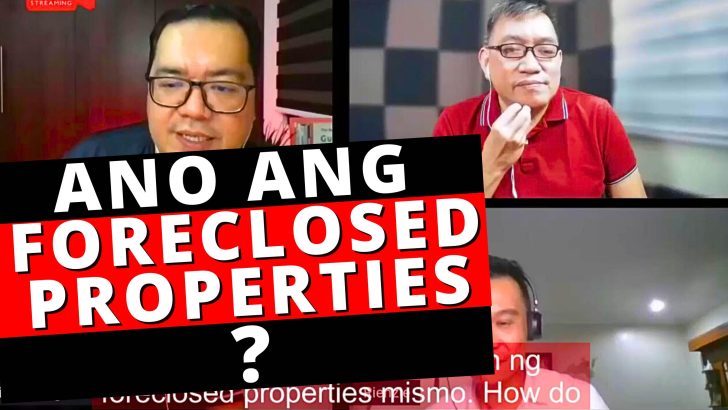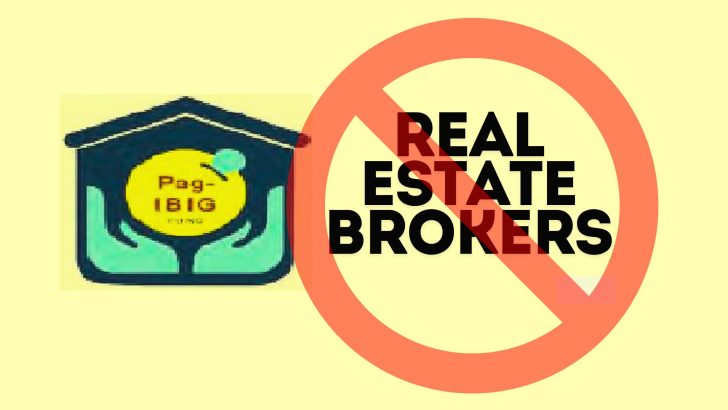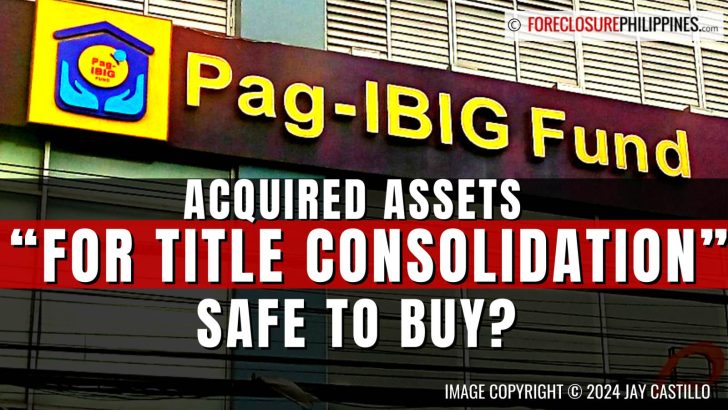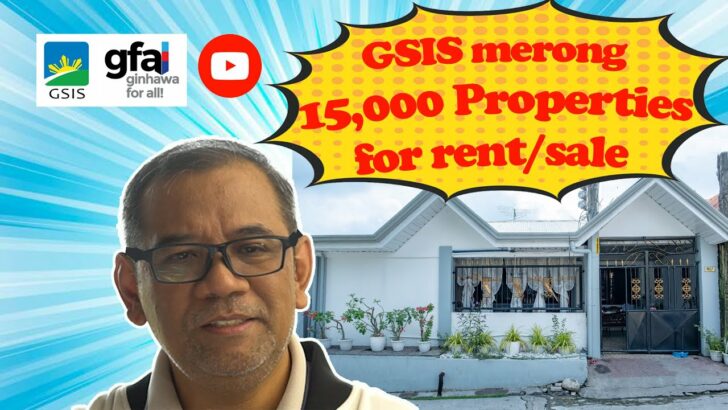Want to spot foreclosed properties with good property values? I’ll share my After Repair Value Calculator/spreadsheet which helped me purchase my first successful deal (It was a foreclosed property bought via auction). I summarized the process into 3 steps.
Sorry if the footage is shaky and if a lady was blocking the view at times, my wife used her cellphone to record the video and she wasn’t able to sit at the front.
This is just one of many videos where I was invited to talk and share our experiences and lessons learned about investing in real estate/foreclosed properties in the Philippines.
I’ll continue sharing more videos like this (I am still unable to make new videos since I am at the hospital most of the time taking care of my mom). Subscribe to get notified when I upload more videos about real estate/foreclosed properties.
Click on the following link to subscribe to my Youtube Channel: https://bit.ly/3dDR0e0
Timestamps
0:00 Intro
0:10 Why you need to define your property goals
0:22 Why I chose to do flipping instead of rentals
0:43 My target After Repair Value or ARV
1:25 Replacement Cost of target foreclosed property
2:40 1% Rule (Gross Rental Yield)
3:13 How I raised capital by managing my finances
3:41 Why financial literacy is needed before buying real estate
4:20 How much money do I need
5:08 How much property you can afford based on downpayment and income
5:57 Mortgage calculator w/ monthly gross income requirement
7:10 How I did my due diligence
8:23 Summary: 3 steps for foreclosed property investing
This is part 2 of my series on how I got started with real estate investing. Here’s a link to part 1: https://youtu.be/FDuwdcogaP0
The method I used to estimate the future market value or After Repair Value (ARV) of a target foreclosed property is the “Replacement Cost” approach.
Another method for getting a property’s market value is the “Market Approach” which I discussed in the following video: https://youtu.be/UBA5m2zPjTA
Links to tools mentioned in the video
Mortgage Calculator: https://www.foreclosurephilippines.com/mortgagecalculator/
ARV or After Repair Value Calculator: https://www.foreclosurephilippines.com/arvcalculator/
Rental Yield calculator : https://www.foreclosurephilippines.com/rental-yield-calculator/
Video Transcript
How was I able to identify my property, as a good deal? If you remember, it was one property after another…
So let’s proceed.
Why you need to define your property goals
How about you, what do you want? Flipping? Rental(s)?
Or you just want to have a property for your own use?
It has to be well-defined. Otherwise, how would you know which property will fit your goals/needs?
Why I chose to do flipping instead of rentals
For me, my goal back then was buy and sell, because I was thinking, I would rather flip properties first so I can raise capital for the next deals.
Because if I only had rentals, it would take too long to raise capital, so I flipped properties.
My target After Repair Value or ARV
And my target was, the After Repair Value (ARV) which is the estimated market value after I finish with renovations, should be like this:
If I compare the ARV to the selling price of a foreclosed property, the selling price should be 40% below the ARV.
So if ARV is Php1Million, I should buy it at Php600,000. So less by 40%, that’s the ballpark estimate, because if the price is 40% below the ARV, I believe the allowance is good enough to have at least 20% NET profit.
So that was my basis, that’s the reason why I bought the property. I bought it at Php1.194M.
How do I know it was a good deal?
Replacement Cost of target foreclosed property
In that particular location, Php9,500/sqm was the selling price of vacant lots during that time. That was my analysis.
And then, the cost to construct of a new house was Php18,000/sqm. That was my estimate in 2009.
Why am I doing this? So that I’ll know… it might be cheaper to just buy a vacant lot and then construct.
It might be cheaper…
Because if it was cheaper, what would that mean?
It would mean that was a bad deal! But no…
If I was going to construct a new house (similar size) and buy a vacant lot that was similar-sized, it would be Php1.8Million [in total]
So I have an allowance of Php610,000.
Can everyone follow?
Okay! So, I have a big allowance, but it was not 40% below ARV. It was only 33% below ARV.
I said to myself “33%” and “40%” that’s close enough, anyway, this isn’t an exact science.
So I purchased the property.
What happened?
The “1% Rule” (Gross Rental Yield) for rental properties
By the way, some of you might prefer rental properties. For rentals, how do you know if it has potential?
In the US, they call it either the 1% or 2% rule.
For us here, the 1% rule is more applicable based on the average. Meaning, you take the monthly rent, divide that by the total selling price, and if the result is more than 1%, it has potential.
It does not follow that automatically it is a good deal, it just means it has potential (and worth more analysis). So that’s for rentals…
Going back, next step…
I already know it’s a good deal based on my analysis. How do I proceed?
How I raised capital by managing my finances
I really need to manage my money so I can finance this deal.
Investing is useless if you can’t manage money, here’s an example:
What if I made a lot of money, but I was not “financially literate”, I’ll just spend it all, then there’s no point, it would be useless, that’s my example.
How about those who win the lotto who spend it all… They’re just the same.
Why financial literacy is needed before buying real estate
And I totally believe financial literacy is a prerequisite to investing in real estate.
Which is why I salute 8990 holdings. as far as I know, they are the only developer that require buyers to attend a financial literacy seminar.
Why is that important?
Because if buyers have no financially literacy, what can happen?
The buyer would run out of money
The purchase contract would get canceled
or
if there was bank financing, it would end up in foreclosure
People rarely talk about this, but all buyers should be aware of this.
How much money do I need
And, my money should be enough (before proceeding with the purchase).
It should be enough for my current expenses.
Actually, I had a Pag-IBIG loan during that time, before I bought this property, so I had other existing obligations.
I also should set aside [money] for my savings.
I also should set aside a portion for emergency funds, insurance, and so on and so forth, and of course I have to have enough money for the downpayment and my monthly amortizations. [And] of course for repairs.
My repair estimates were quite off. My estimate was Php30,000. The actual was Php130,000. But it was okay since the allowance I had was quite big, I still made a profit.
And of course, taxes.
How much property you can afford based on downpayment and income
Next, the question is, How much can I afford?
For foreclosed properties, these are typical…
The minimum downpayment is 10% to 20%. For this particular property, it was 20%.
The monthly amortization depends on the terms and the maximum monthly amortization is 40% of the gross monthly income. Again, you should all follow this. You should not over-leverage. Lets say your income is Php20,000 a month, will you buy a property with a monthly amortization equal to Php 20,000 a month?
That’s possible if you don’t eat.
[audience laugh]But you have to eat! You have a family,you have to make payments for the house you live in…
Of course, you need to have an allowance for all of those.
The banks already determined that 40% is the maximum monthly amortization so let’s stick to that.
Mortgage calculator w/ monthly gross income requirement
Example, lets go back to my property, I bought it for Php1.197Million at 20% down payment, payable in 10 years at 12% annual interest rate.
The question is: How much is my down payment? Monthly amortization? And can I really afford it?
I have a tool, actually any mortgage calculator can answer this. This is what I have on my website
I’ll just read for you all because it’s small.
Selling price: Php1.194M
Down payment: 20%
For a 10 year loan
Interest rate at 12%
The gross monthly income I need is Php34,200+
But the monthly amortization is only Php13,704
So there’s an allowance, I have extra money for my other obligations. It should be like that.
Otherwise, If you encounter a financial problem, It will get foreclosed.
So that’s how you determine how much money do you need. Of course, you have to factor in repairs, taxes, etc.
So it’s okay, I can afford it.
Do I proceed and buy? Not yet.
I still have to do my Due Diligence.
How I did my due diligence
What is Due Diligence?
I have to answer: Is it illegally occupied?
Does it have informal settlers?
Is the former owner still there?
For me, I have a rule, if the property is occupied by the former owner, out of respect, I will move on to another property and I hope they will be able to remedy their situation.
Does it have a “lis pendens”? Does it have a pending court case?
Does the property have a title? Tax declaration? Are they consolidated? Are they under the name of the bank?
Are there any arrears for electricity?
How about arrears for water?
Any arrears for Home Owner Association (HOA) dues? Condo dues?
I was lucky, for my property, the bank will shoulder the payment for arrears.
So that’s one aspect you need to check.
Next, how much are the taxes? how much are the transfer costs?
What are these? CWT, DST, Transfer Tax, Registration fee, etc. All of those.
Of course, I cannot explain all of these, we will run out of time, but you have an idea, what are the things which will cost money.
Because if we don’t consider all of these, you might think you are finally investing, but it turns out you are losing money.
You should know all of these. And physical, legal, financial aspects… Are they okay?
Of course, repair estimates should also be accurate. As I mentioned, mine was not. My estimate was Php30k, actual was Php130k.
Summary, here are the 3 steps to find foreclosed properties with good property values
1. Begin with the end in mind – You should know what you want (so you’ll know which property fits)
2. Get your finances in order
3. And do your Due Diligence
And that’s the only time that you can consider buying that investment. Okay!







![Why invest in foreclosed properties in the Philippines? + Top things to consider [Video] 5 Why invest in foreclosed properties in the Philippines? + Top things to consider [Video]](https://www.foreclosurephilippines.com/wp-content/uploads/2023/03/video-how-to-invest-in-foreclosed-properties-in-the-philippines-v3-728x410.jpg)
